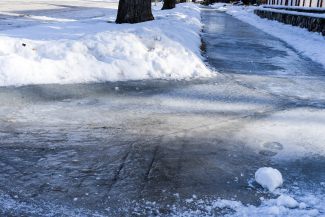Incident Lessons Learned: Slip on Ice
24 November 2023

Summary
Every winter U of A staff and students experience near misses, incidents and injuries due to slips on ice. In the 2022/2023 winter season, HSE received numerous reports of slips related to winter conditions. It is expected that these incidents are underreported and that we had a much larger number of incidents and near misses throughout the year.
Every year it is important to provide reminders of what to expect and what to do when snow and icy conditions arise.
Consequences
The majority of slips on ice are minor where the individual is able to prevent a fall or catch themselves during the fall to prevent an injury. However, slips on ice can result in a variety of injuries including:
- musculoskeletal injuries in the back, hips, shoulders, legs, or arms
- severe bumps, bruises, and broken bones from contact with hard surfaces
- concussions or other head injuries from hitting the head on ice, concrete, or other hard surfaces
Culture of Care
The Culture of Care calls for all employees to take responsibility for their own safety and that of others. With that in mind, always ensure your own safety in every situation—including where icy surfaces are involved—and then take steps to prevent an incident from happening to others.
Call to Action
Facilities and Operations sets snow and ice removal as a top priority during the winter months. However, during heavy snowfall or changing weather conditions (such as melt/freeze cycles) they are not always able to reach every spot on campus before a staff member or student arrives.
Take steps to minimize your own risk:
- Choose suitable footwear (including removable “ice trax” or similar devices).
- Keep your hands free and use railings.Wear gloves so you don’t stick your hands in your pocket or freeze on the cold railings.
- Plan your route and/or extra time to take indoor routes where possible
- Walk like a penguin.
When you see a hazardous situation, don’t assume others know about it. Report it.
The University of Alberta is committed to the safety, health and well-being of our faculty, staff and students. Every day, we advance this commitment to safety through the Culture of Care.


